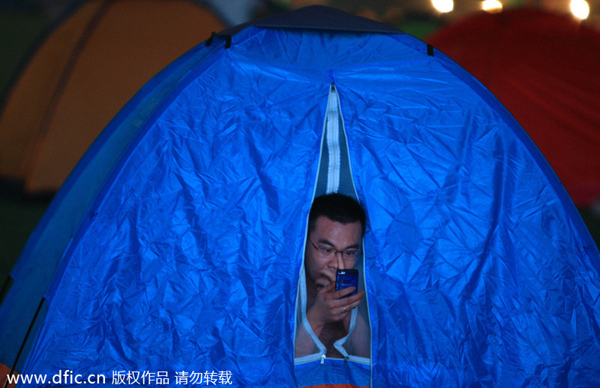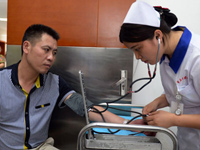|
 A man watches the World Cup's opening match via his mobile phone inside a tent on a stadium?in Changsha city, Central China's Hunan province, on the early morning of June 13,?2014. Throughout the night, about 1,000 soccer fans watched the matches inside the stadium. [Photo/IC] |
|
 Warning: World Cup can damage your health |
At least five people have died of strokes and heart attacks, after watching games continuously at nights, according to media reports from Shanghai, and Jiangsu and Guangdong provinces.
Now, doctors are asking soccer fans to take it easy.
"From a doctor's perspective, it is wise to sacrifice one's sleep and health only to a reasonable extent, because otherwise, the effects might be deadly," says Guo Lijun, a senior cardiologist with the Peking University Third Hospital. Guo says he gets the whole frenzy but cautions against medical risks.
Studies have shown that sleep deprivation is associated with increased incidence of strokes and heart attacks, especially among people who already have cardiovascular problems, such as diabetes and high blood pressure, or people with a history of heart ailments in families, he says.
However, because most cardiovascular diseases offer little warning in daily life, many people are not aware of its threats, he adds. In emerging economies such as China, where hectic living is leading to sedentary lifestyles and unhealthy eating habits, a large number of young people tend to suffer from obesity and cardiovascular problems.
"While people stay up (at night) and binge on beer and high-fat food, getting excited, they don't know they might be risking their lives," Guo says.
He warns against staying continuously awake, and suggests that people take leave from work to sleep during the day if they aren't able to resist the temptation of watching back-to-back matches at night.
A young person without major health issues can manage on four hours of sleep as a minimum requirement in 24 hours, but people with heart-related problems or other health issues need to sleep longer, experts say.
Sleep deprivation is bad for the stomach as well, according to Zhang Kejian, a specialist on digestive tract diseases with the Beijing-based China-Japan Friendship Hospital.
Humans have body clocks that largely factor in when to eat or sleep, but late-night activities disrupt the clock and influence the secretion of digestive enzymes that lead to indigestion and abdominal distension among other problems, Zhang says.
For people who already suffer from digestive tract ailments such as gastric ulcer, staying up late while snacking and drinking alcohol - as many soccer lovers do - is a bad idea. Acute pancreatitis, which is a sudden swelling of the pancreas, and can be lethal, could result from such excesses.
But not all is gloom and doom.
Zhang's tip to diehard soccer fans is: "If you really want to stay up for the games, drink water and only eat fruit and nuts. Don't have alcohol or spicy dishes."